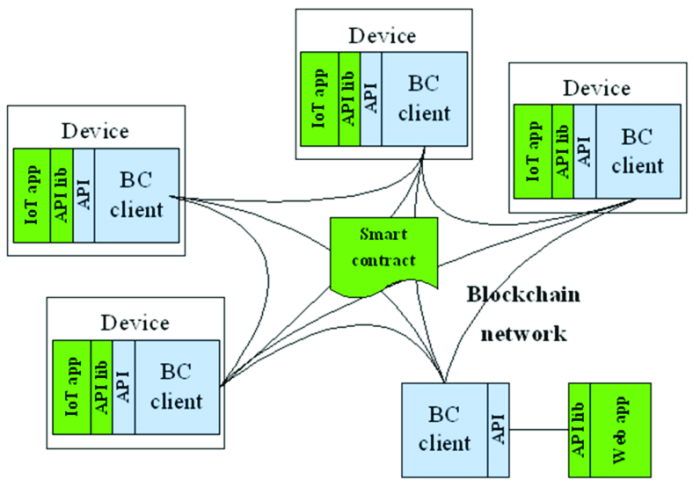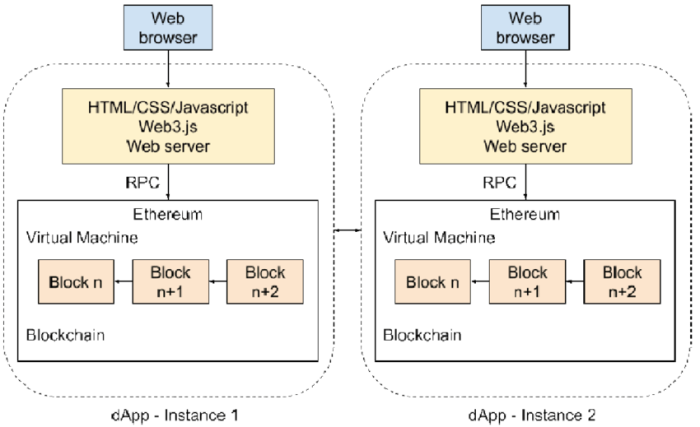As The Role of Ethereum in Decentralized Applications takes center stage, this opening passage beckons readers with american high school hip style into a world crafted with good knowledge, ensuring a reading experience that is both absorbing and distinctly original.
Ethereum, a game-changer in the realm of decentralized applications, is redefining the way we interact with blockchain technology. From smart contracts to decentralized finance, Ethereum’s impact is undeniable and continues to shape the future of digital innovation.
The Basics of Ethereum
Ethereum is a decentralized platform that enables developers to build and deploy smart contracts and decentralized applications (DApps). Unlike Bitcoin, which is primarily a digital currency, Ethereum serves as a platform for a wide range of applications beyond just financial transactions.
Smart Contracts and Their Role in Ethereum
Smart contracts are self-executing contracts with the terms of the agreement directly written into lines of code. These contracts automatically execute and enforce the terms of the agreement without the need for intermediaries, such as lawyers or banks. In the context of Ethereum, smart contracts are written in Solidity, a programming language designed specifically for creating smart contracts on the Ethereum blockchain.
Significance of Ethereum’s Blockchain Technology in Decentralized Applications
Ethereum’s blockchain technology provides a secure and transparent way of recording transactions and executing smart contracts. The decentralized nature of the blockchain ensures that no single entity has control over the network, making it resistant to censorship and tampering. This technology forms the foundation for decentralized applications, enabling developers to create innovative solutions across various industries, from finance to supply chain management.
Ethereum’s Impact on Decentralized Applications: The Role Of Ethereum In Decentralized Applications

Ethereum has truly revolutionized the development of decentralized applications (DApps) by providing a robust platform that allows developers to create smart contracts and DApps with ease.
Popular DApps on Ethereum
- Uniswap: A decentralized exchange allowing users to swap various cryptocurrencies directly from their wallets without the need for a central authority.
- Compound: A lending platform where users can lend or borrow cryptocurrencies, utilizing smart contracts to automate the process.
- CryptoKitties: A popular game where users can collect, breed, and trade unique digital cats using Ethereum’s blockchain technology.
Enhancing Security and Transparency
Ethereum’s decentralized nature enhances security in DApps by removing the risk of a central point of failure. Since DApps run on the Ethereum blockchain, they are resistant to censorship and tampering. Additionally, the transparent nature of the blockchain ensures that all transactions and data are publicly visible and immutable, enhancing trust among users.
Ethereum’s Role in Decentralized Finance (DeFi)

Ethereum plays a crucial role in powering decentralized finance (DeFi) projects by providing a secure and decentralized platform for financial applications to operate on.
Decentralized Exchanges (DEX) on the Ethereum Network
Decentralized exchanges (DEX) are platforms that allow users to trade cryptocurrencies directly with one another without the need for a central authority. These exchanges operate on the Ethereum network using smart contracts to facilitate peer-to-peer transactions.
- DEX platforms offer users greater control over their funds as they can trade directly from their wallets without having to deposit their assets on an exchange.
- By eliminating the need for intermediaries, DEX platforms reduce the risk of hacks and security breaches that are common in centralized exchanges.
- DEX platforms also promote financial inclusion by enabling users from anywhere in the world to access financial services without requiring permission from centralized authorities.
Advantages of Using Ethereum for DeFi Applications
Ethereum provides several advantages for DeFi applications compared to traditional financial systems.
- Smart contracts on Ethereum automate the execution of financial transactions, reducing the need for manual intervention and the associated costs.
- Ethereum’s programmability allows developers to create customized financial products and services tailored to the needs of users.
- The transparency and immutability of the Ethereum blockchain ensure that all transactions are recorded on a public ledger, enhancing trust and accountability in the DeFi ecosystem.
Ethereum 2.0 and Scalability

Ethereum 2.0 represents a significant upgrade from the original Ethereum blockchain, aiming to address key issues like scalability and energy efficiency. This transition is crucial for the future development and sustainability of decentralized applications (DApps) running on the Ethereum network.
Transition to Ethereum 2.0, The Role of Ethereum in Decentralized Applications
The transition from Ethereum to Ethereum 2.0 involves shifting from a Proof of Work (PoW) consensus mechanism to a Proof of Stake (PoS) consensus algorithm. This change is expected to significantly improve scalability by increasing transaction speeds and reducing energy consumption.
Importance of Proof of Stake for DApps
Proof of Stake (PoS) in Ethereum 2.0 is crucial for DApps as it offers a more energy-efficient and secure way of validating transactions. This upgrade allows for the creation of more complex and resource-intensive decentralized applications without compromising on performance or sustainability.
Challenges and Benefits of Ethereum 2.0
Challenges:
- Transitioning the entire Ethereum network to Ethereum 2.0 smoothly without disruptions.
- Ensuring the security and stability of the new PoS consensus mechanism.
- Managing the expectations of the community and developers during the transition phase.
Benefits:
- Significantly improved scalability, allowing for more transactions per second on the network.
- Enhanced energy efficiency, reducing the environmental impact of Ethereum mining.
- Opening up new possibilities for innovative DApps that require higher throughput and lower latency.



